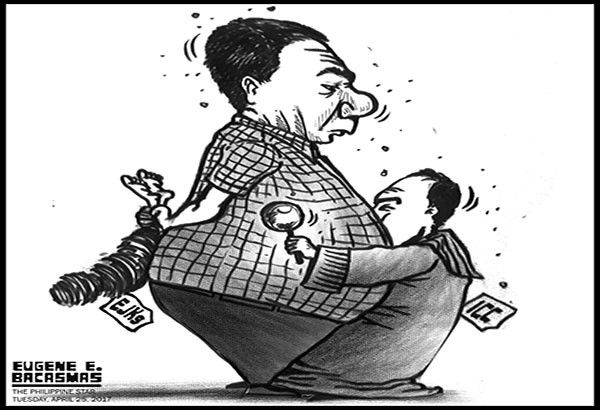EDITORIAL - A case in the ICC

Not unexpectedly, a complaint was filed yesterday against President Duterte before the International Criminal Court for crimes against humanity in the course of his brutal campaign against illegal drugs and criminality. The 77-page complaint was filed by the lawyer of Edgar Matobato, who claimed to be part of a death squad in Davao when Duterte was the city’s mayor. Included in the complaint before the ICC are at least 11 senior Philippine officials.
Senators had grilled Matobato as well as Arthur Lascañas, another self-confessed hit man who claimed personal knowledge of the killings. But citing inconsistencies in the two men’s stories as well as the lack of corroborating material evidence, the Senate dismissed the testimonies as hearsay.
The Senate probe may be cited by the government if ever the ICC decides to accept the complaint and go to trial. The ICC, set up in July 2002, can assume jurisdiction over such a complaint and try a democratically elected president of a sovereign state only if all the mechanisms for settling such issues domestically are no longer functioning.
The best defense against seeing any Philippine official tried before the ICC is to show that these mechanisms are working. Police and government prosecutors are investigating complaints involving summary executions and other abuses attributed to the conduct of the drug war, but more can be done to prevent abuses and improve the credibility of the probes.
The government can also do more to encourage aggrieved parties to pursue complaints against abusive police and other law enforcement personnel, barangay officials and government militias who are suspected of carrying out vigilante killings.
A sitting Philippine president can be removed only by impeachment, and enjoys immunity from suit while in office. So far the impeachment route has not yet been tried against President Duterte.
Malacañang dismissed the complaint as black propaganda and is awaiting the ICC’s action. It would be counterproductive for the government to wage war on the ICC, which is merely assessing the merits of a formal complaint. The best defense for the government is to show the world that the system is not broken in the Philippines, and there is no need for the ICC to step in.
- Latest
- Trending

























